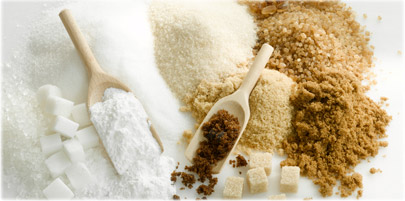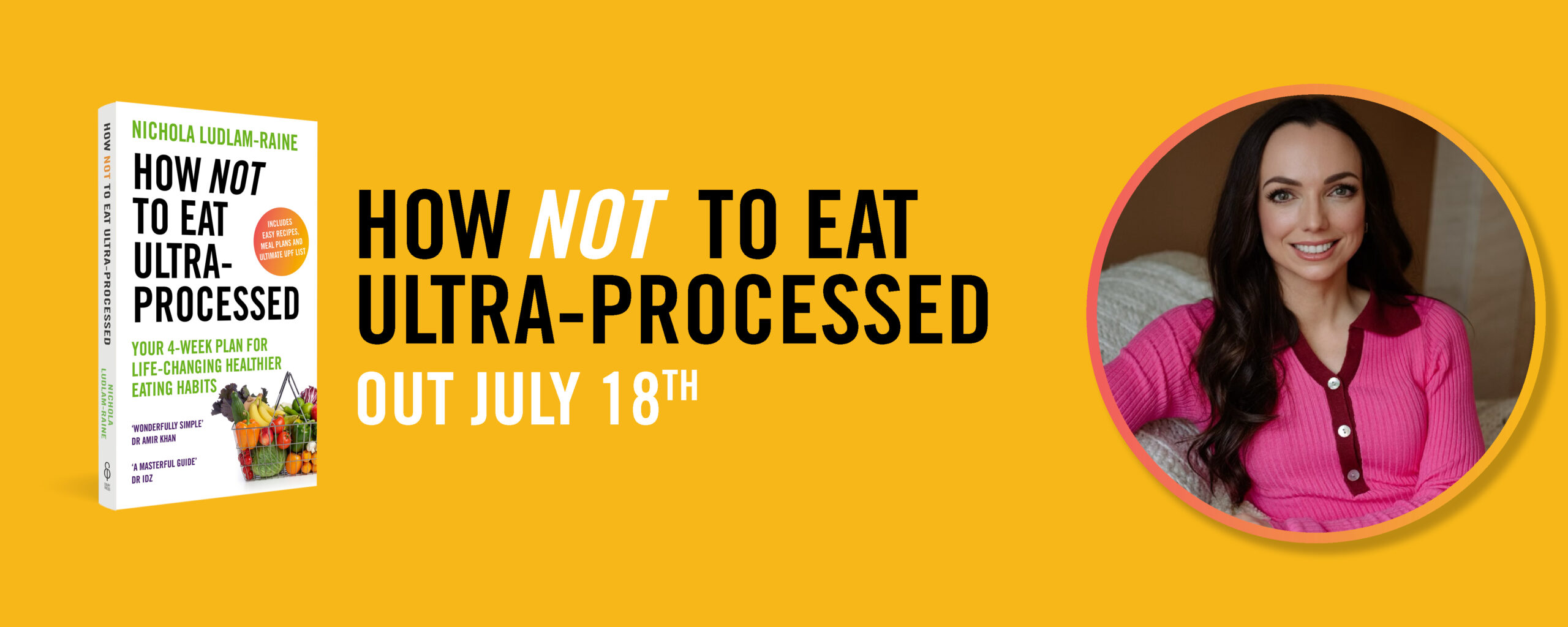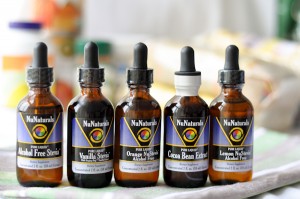
With more and more people watching their weight and calorie intake, sugar can easily be ‘evilized’ with many people choosing to switch to other sources of sweetness. A small amount of sugar in the diet isn’t bad for us.. there are naturally occurring sugars such as fructose in fruit and lactose in milk, and then there are added sugars (sucrose) which is table sugar.
Sucrose is found in many processed goods such as cakes, sweets and biscuits and is known as ’empty calories’ as all table sugar provides is that.. calories and nothing else. Per teaspoon of sugar provides around 20 calories, which in the grand scheme of things isn’t a lot.. it can however add up e.g. 5 cups of tea a day with 2 sugars = 200 kcal / day = 20lb weight gain in a year (~1.5 stone!). Sugar also causes tooth decay, especially when eaten frequently during the day. There is no evidence to suggest that sugar is addictive in humans however sugar does to many people taste good, which in turn stimulates feel-good hormones (endorphins).
Sugar-alternatives have become more and more popular over the years with both natural and artificial ones available. Here’s my personal favourites of the natural sugar-alternatives:
- Stevia – Made from a herb, stevia is up to 40 x sweeter than sugar but has zero calories and won’t affect blood sugar levels. I love stevia in hot drinks and also baking (check out my breakfast cookie recipe!).
- Stevia Drops
– Stevia drops are not only calorie free but come in lots of different flavours. I have vanilla and it tastes great in porridge, Greek yoghurt, coffee, rooibos tea, smoothies and shakes. What I have learnt though is that *less is more*.
- Xylitol – A natural sugar alcohol which can actually prevent tooth decay. It contains 40% fewer calories than sugar and 75% less available carbohydrate. It also has a GI* of only 7 (out of 100) meaning it won’t spike blood sugar levels. Use in tea coffee or baking (check out my pumpkin muffin recipe!).
- Agave Nectar – A low GI* sweetener derived from a plant, it’s super sweet and so you need less. It tastes great in porridge, tea and baking where honey or syrup is used.
- Manuka Honey – Manuka honey in particular has some fantastic health benefits. Its antiseptic properties make it great for sore throats and it can also help to improve digestive health (it boosts the growth of good bacteria) and is crammed with antioxidants.
- Sweet Freedom
– Made from 100% fruit sweet freedom has 25% fewer calories than sugar and has a low GI*. It tastes lovely in porridge, tea and baking.
*GI = Glycaemic index. The GI is a ranking of how quickly a carbohydrate will effect your blood sugar levels. Glucose has a GI of 100 and so will effect blood sugar levels very quickly. In general, the more processed a food, e.g. white bread, the higher the GI. Sugar actually has a medium GI and foods which are high in soluble fibre such as oats, beans, fruit and vegetables tend to have a lower GI. Milk and milk products also have a low GI and adding protein e.g. meat/fish and fat e.g. nuts/seeds (GI of 0) will lower the overall GI of a food/meal.
There has been a lot of negative press about artificial sweeteners such as saccharin, aspartame and sucralose, however sweeteners added to foods and drinks in the UK have all passed thorough safety tests and have received approval from the EFSA (European Food Safety Authority) for human consumption, the US Food and Drink Administration (FDA) have also deemed them safe. Rumours persist however about the hazards of artificial sweeteners, with aspartame in particular targeted: In order to exceed the acceptable daily intake (ADI) for aspartame, an adult weighing 60Kg would have to drink at least 14 cans of a diet soft drink per day (you’d probably have no teeth left at that rate either!). You can read more about the safety of aspartame [HERE]. Artificial sweeteners can be a useful tool for individuals who are trying to lose weight and for those with diabetes as they are calorie free and do not raise blood sugar levels. I would advise however limiting your intake of anything artificial as your liver will still have to break it down. If you do use artificial sweeteners regularly try to cut down on your intake, use a natural alternative, or use different types- for example use one type at home and one at work. You should also be aware that some sweeteners, such as aspartame have been linked to headaches in sensitive individuals.
If you’re watching your weight then choosing lower calorie/low GI natural sugar-alternatives could be useful, however cutting down on all added sugars/sweeteners will help to reduce your reliance/cravings for sweet foods, which will be good for your weight.. especially if you justify having that side portion of chips because you ordered a ‘diet Coke’ (!).
*Stevia drops were supplied to me free of charge to try however this review is 100% honest and of my own opinion. I was not influenced in any way by the free samples supplied and do not promote these products more than other products that I have not reviewed. This blog post contains affiliate links. Please read my disclaimer page for more information.


Love the article, Nic. Awesome website too! 😀 x
Thanks Ro 🙂 x
Very Interesting article with lots of info that I never knew, this has opened
Eyes to watch the amount of sugar in our diets! 🙂
Thanks Vicky 🙂
.Hey Nic, I wanted to know where you can get Stevia in the UK, thanks
Hey! I get mine from either amazon, http://www.luxebc.com (stevia drops) or my local supermarket (near the other sweeteners). Hope this helps!
Hi Nic, what a fantastic website!
great post on sweeteners they really are not bad for you! (everything in moderation hehe) Just one thing, I didn’t think the liver broke sweeteners down? I thought they passed through as a whole molecule into the urine as our body doesn’t utilise any of the sweeteners, but it could still have an impact on the liver. Interesting discussion point!
Hi Adele, all the sweeteners on sale have been tried and tested and are safe for human consumption – your liver does break down products and as long as you don’t excessively drink alcohol it should be working just fine! I hope this helps! Thanks for your comment! Nic x
Finding this has come at the perfect time for me! I have been battling sugar induced cravings and little binge episodes for the past few months so am trying to cut out all naughty sugar and just stick with the natural stuff (i.e. fruit).
I will definitely have to try some baking with Stevia or Sweet Freedom! x
Hurray!! For baking stevia is good for adding sweetener and no bulk, sweet freedom is good for adding sweetness when you need a liquid and xylitol is good for both sweetness and bulk!! Hope this helps 🙂 xx
Hi Nic – thanks for another great article! Can I just ask – I’m a huge fan of fruit and will often have 4-5 pieces of fruit daily. I never thought anything of this, as I’ll often snack on fruit in favour of other snacks or junk food, but recently I’ve heard a few people mention that you shouldn’t eat too much as it’s high in sugar. This has never concerned me before, it sounds silly to avoid eating fruit, but now I worry my diet may be too high in sugar? X
Hello! Thanks 🙂 We are recommended to eat 5-9 portions of fruit and veg a day, a portion being a handful. The advice I give people with diabetes is to limit fruit to a handful at anyone time – so 4-5 pieces is ok but it must be spread over the day. On average a piece of fruit comes in at just 50kcal/15-20g carbs due to the high fibre and water content.. meaning you’re much better off eating fruit than biscuits.. plus it’s low GI, fat free and is packed with vits, mins and antioxidants!! SO you’re A-OK! x
Thank you for this post! Artificial sweetener is a conversation that always goes on in my household and anything with artificial sweetener is rejected…thank you for setting the story straight
No problem Kelly 🙂 Glad to be of help and thank you for your comment! Nic
Hi Nic
I love your recipes and blog. It is really helping me look after myself and get my fitness back on track as I have a cardiac condition as well as asthma. Could you please tell me what are good brands of xylitol or stevia. When I searched on amazon some of them were mixed with other things. So would preferably like to get something that is pure.
Thanks
Sarah xx
Hello! I personally use Total Sweet which is xyltiol 🙂 xx